3.2 has been released (opens new window)! 3.2 is a rewrite of the Web App subsytem that adds a wealth of new features including:
- 1-click support for Nextcloud with enhanced security through Fortification (opens new window)
- general
webappmodule for agnostic Web App interfacing - Web App manifests (opens new window) for extending base features
- an AST parser for powerful WordPress integration
- 1-click cloning/renaming support for WordPress
- third-party (opens new window) Web App support
- Argos glance
- notification tray
- DNS providers for Katapult (opens new window) and Hetzner (opens new window) services.
Let's walk through some of the newer features, beyond just a much needed facelift.
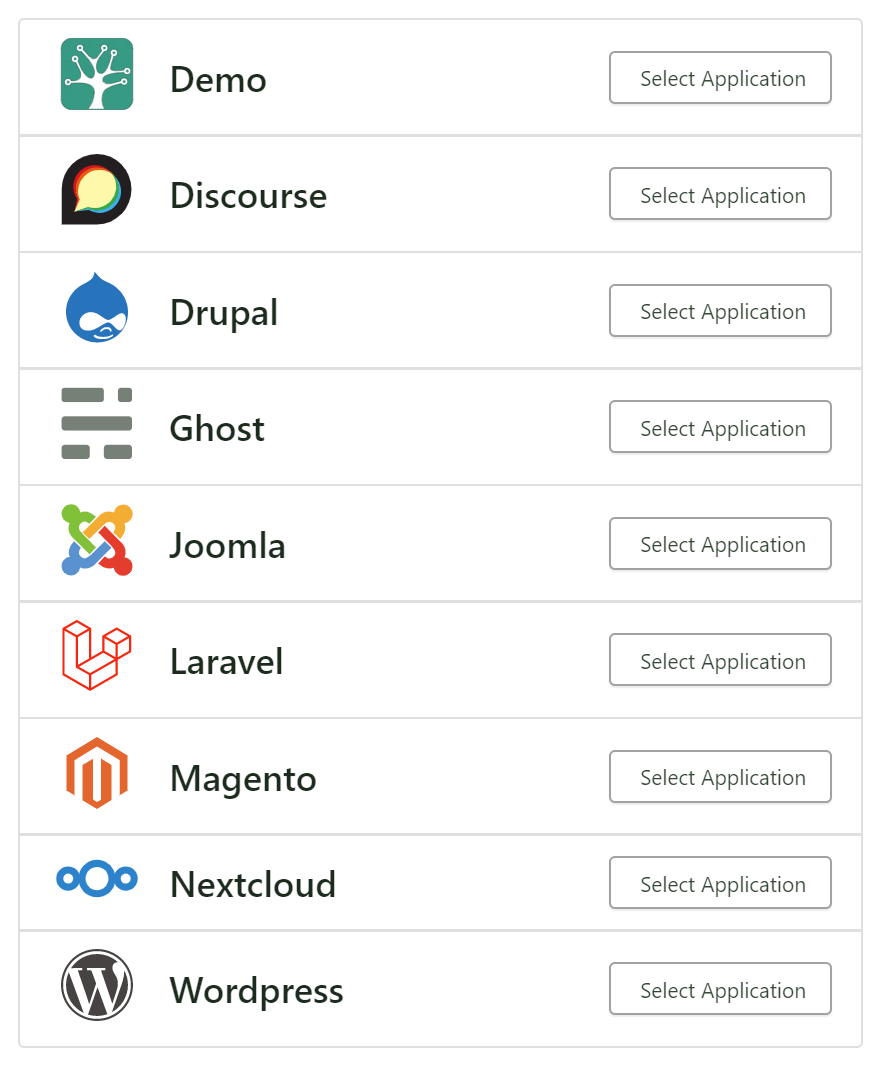
# Nextcloud support

It's no surprise that Nextcloud is establishing itself as an indomitable all-in-one solution for managing all things yours. We've brought Nextcloud to ApisCP as a 1-click and enhanced its security with our Fortification subsystem. By default, Nextcloud is installed without the ability to manage its own apps, but this may be easily changed by going to Web > Web Apps > Select domain > Fortification > Fortify (MIN). It's recommended to enable MAX Fortification once you've installed the apps you want.
For added peace of mind, Nextcloud automatically updates whenever a new release comes out. You'll always get an email whenever an update happens unless you've configured otherwise via Account > Settings > App Settings.
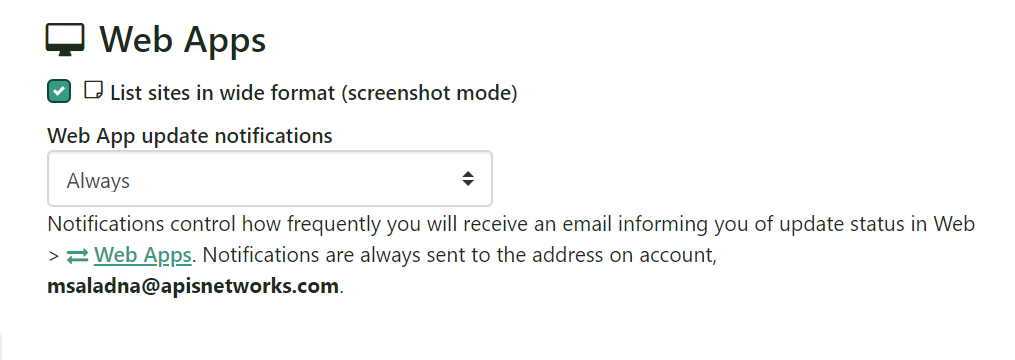
# Web App enhancements
Web Apps are smarter and more powerful than ever before. ApisCP 3.2 now includes an agnostic module webapp that queries the right module API. Don't know what's under mydomain.com, but want to update it? webapp:update-all("mydomain.com"). ApisCP will look at its stored metadata and direct the API call accordingly. Likewise webapp:discover($domain, $path = '') will enumerate each known Web App to determine if it's a match, then update its internal records.
# Manifests
Web Apps have also extended to permit user-defined behavior with Fortification and database management through manifests. Manifests are a remarkable addition that can redefine tasks. db_config(), fortify(), and unfortify() are supported with plans to expand to encompass all webapp() API functions.
Manifests require two-factor authentication to use, first panel authorization then end-user acknowledgement to resign the manifest if its content changes from the signature.
 Creating a manifest under Web > Web Apps
Creating a manifest under Web > Web Apps
Manifests follow an intuitive YAML format, which require signage after editing under the Behavior > Manifest section.
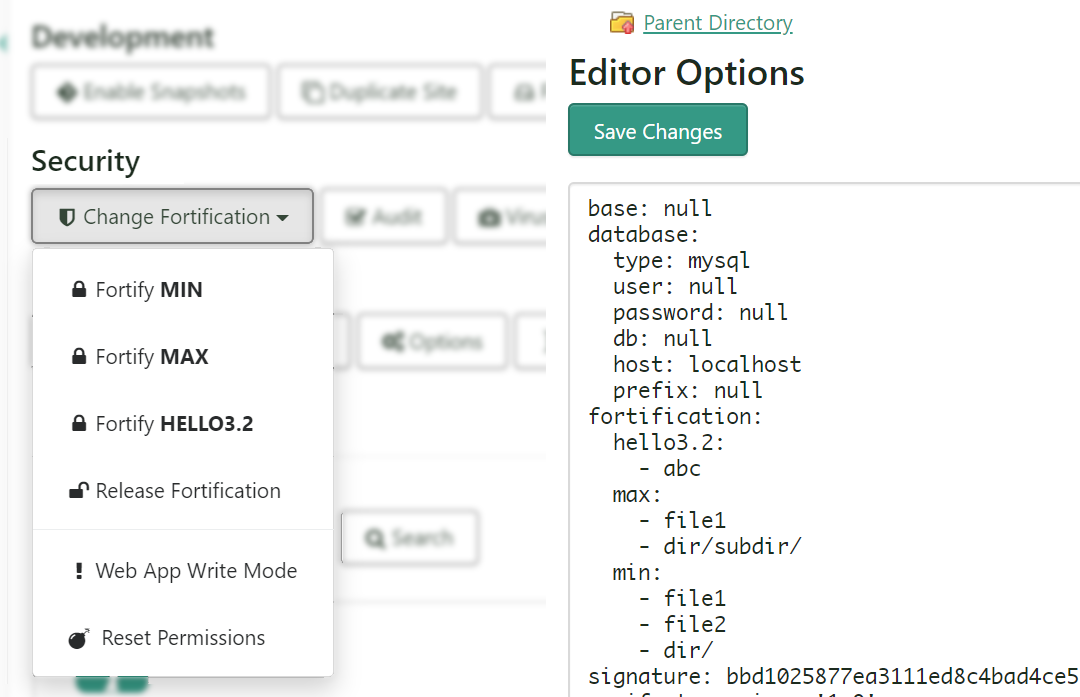
# WordPress enhancements
ApisCP began as a hosting platform for WordPress, among other PHP applications, in the early 2000s. Platform design evolved in response to bolster security from a proliferation of bad code that impacted not only WordPress (opens new window) but other (opens new window) PHP (opens new window) applications (opens new window) over (opens new window) the (opens new window) last (opens new window) 20 (opens new window) years (opens new window). Security can and should be pushed to the center of attention not only because it reduces administrative burden but also keeps one attentive to new goals.
WordPress is here to stay. It's come a long way from its humble origins of Matt Mullenweg stumbling across his misplaced $500,000 investment check (opens new window). ApisCP has continued to adapt to new trends helping site owners stay ahead of emergent threats, striking a superb balance between protection and performance. We're improving Fortification integration by adding a powerful AST parser that can reconfigure wp-config.php with a flick of the switch, quite literally.
3.1 added a latent feature, FS_METHOD, on new installs. Today we're leveraging this feature to communicate with WordPress how it should expect to handle your files in a reliably programmatic way. Whenever wordpress:fortify() is called, ApisCP looks for define('FS_METHOD', XXX); and replaces XXX with the typed property. Have some older imports from cPanel you'd like to enroll in this facility? Use an API hook to add them:
<?php
\a23r::registerCallback('wordpress', 'valid', function ($ret, $args) {
if (!$ret) {
return;
}
$approot = $args[0];
if ($approot[0] !== '/') {
// passed as $hostname, $path
$approot = $this->getAppRoot($args[0], $args[1] ?? '');
}
$pairs = [
'FS_METHOD' => false,
'FTP_USER' => $this->username . '@' . $this->domain,
'FTP_HOST' => 'localhost'
];
return $this->updateConfiguration($approot, $pairs);
});
via config/custom/boot.php
wordpress:valid() is triggered during plugin/theme enumeration as part of periodic updates. Running a manual update would update all valid WordPress installs with the new configuration:
cpcmd admin:update-webapps '[type:wordpress,assets:true]'
# Site clone/rename
With nearly 2,500 API commands and growing, there's something for everyone. One of the lesser known features introduced in [cPanel migrations](admin/Migrations - cPanel.md) is piped import/export operations for both PostgreSQL and MySQL. Mix the above AST parser with a copy operation and we've got a robust cloning mechanism 😊.
ICYMI, next release will be 3.2.0 that brings some incredible improvements to Web Apps. WordPress, for example, can now reconfigure its site_url and rewrite all embedded posts with a click of the mouse. pic.twitter.com/coMYNYXEwW (opens new window)
— Apis Networks (@apisnetworks)
August 2, 2020
# Demo Web App
There's a new home for Web Apps, config/custom/webapps. A sample web app is available via @apisnetworks/apiscp-webapp-demo (opens new window) that introduces an irregular API module and accompanying Web App handler. This feature is still very nascent, although if you have any questions feel free to pop into chat for assistance (opens new window). Storyboards help build stronger products.
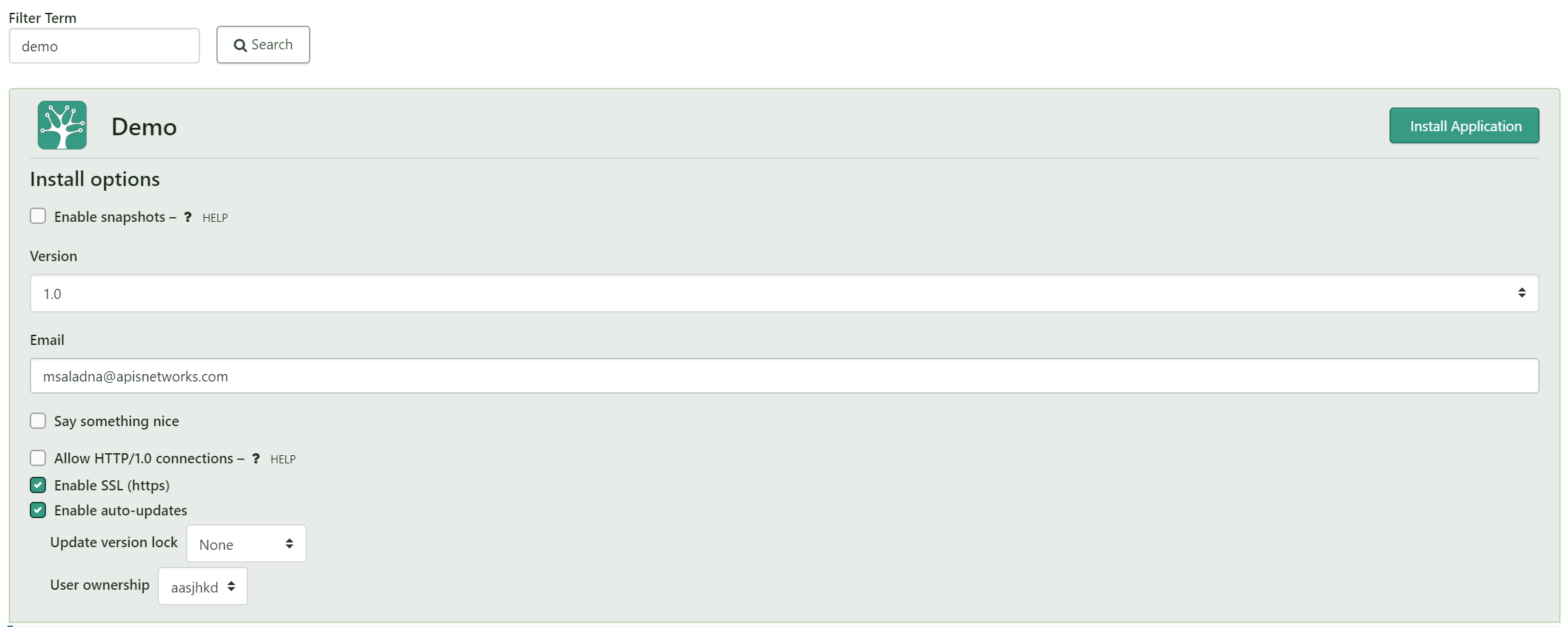
# Argos glance
Argos is a comprehensive monitoring suite for ApisCP, which even has the ability to forward events to your mobile device. It's a great way to both passively and actively monitor your servers for extraordinary events. 3.2 brings Argos to the administrative Dashboard for faster recognition of issues.
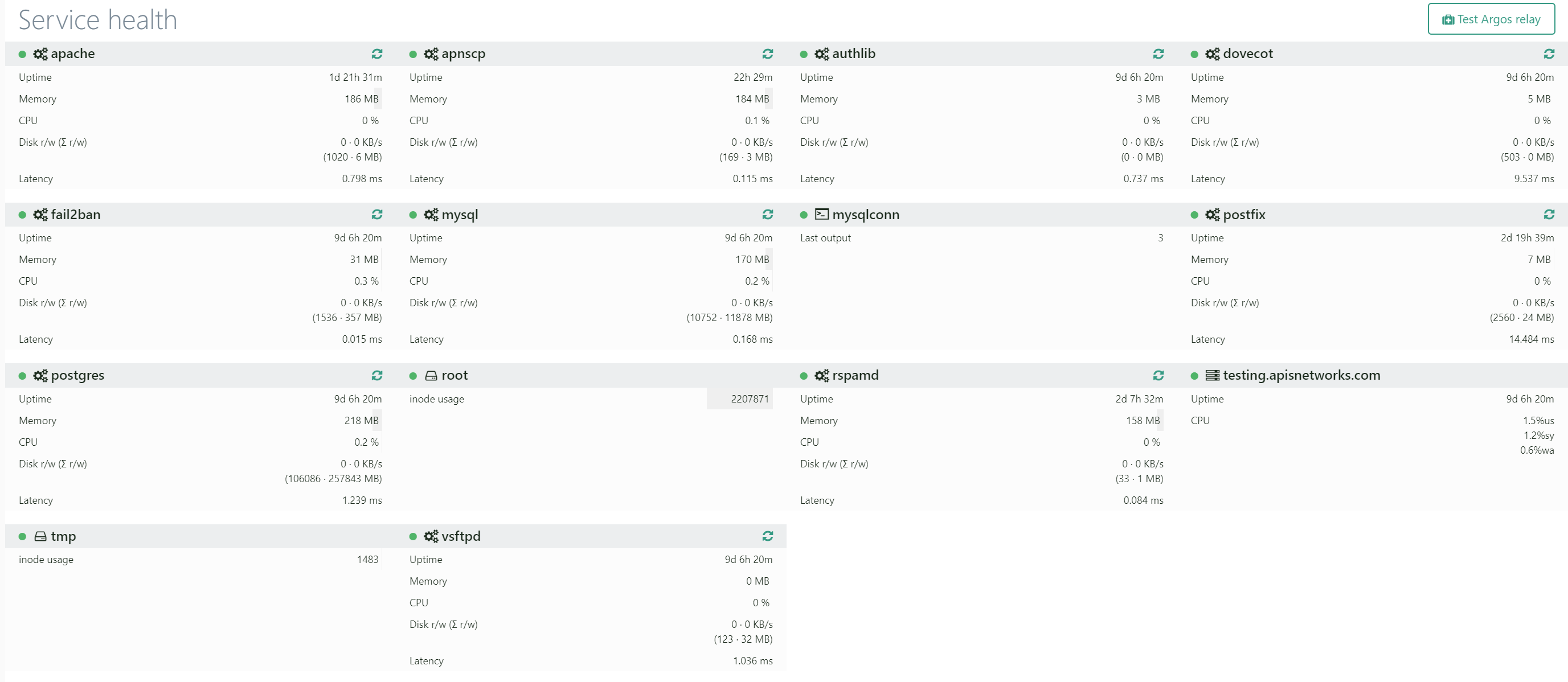
# Notifications
Notifications will be expanding in 3.2 to include Web App installs. It's still in RFC stage. More details will be provided via docs.apiscp.com (opens new window) and announced via @apisnetworks (opens new window) when available. Feedback is always appreciated — ApisCP would never be where it is today without its users.
# Katapult + Hetzner providers
Lastly, the DNS family has grown to include Katapult (opens new window) and Hetzner (opens new window). Katapult is a new VPS service from Krystal Hosting. Hetzner has expanded their services to include public DNS, which is an excellent alternative to Cloudflare (opens new window).
# 3.3 horizon
rspamd multimap, Postfix ccerts, {admin,site}:bless, WPScan feature, Plesk/DirectAdmin migration. Stay tuned 😄
# Changelog
# 3.2 release 🎉
Web Apps facility rewrite, significant improvements to functionality.
NEW
- [Bootstrapper] BSARGS= environment variable for passing off --extra-vars=$BSARGS to ansible-playbook, e.g.
env BSARGS="--force=yes" upcp -sb - [CLI] "serialize" output/input format added. Uses builtin PHP serialization to pass objects around unadulterated.
- [Dashbord] add Argos glance.
- [DNS] Katapult, Hetzner DNS providers. Katapult is an upcoming premium VPS, Hetzner provides free DNS service.
- [dns] verify(), verified(), challenges() API calls for third-party DNS providers that require additional challenges.
- [git] add_ignore(), list_ignored_files()- manage ignored files for git repository.
- [web] get_all_hostnames_from_path()- given a docroot, find all hostnames that serve from this base location.
- [webapp] general purpose Web App module. Don't know the web app installed under a document root, but want to update it? cpcmd -d mydomain.com webapp:update mydomain.com. All family methods are exposed through this module except install().
- [webapp] get_reconfigurable()- get a reconfigurable value either transient or fixture.
- [Web Apps] learn, write, release are now callable from API. wordpress:fortify("mydomain.com","","learn", [10]);
- [Web Apps] fortification_modes()- list all Fortification modes available to an app.
- [Web Apps] Nextcloud 1-click support.
- [Web Apps] Manifests. Bolt on Fortification and database snapshot/rollback support to any document root on your account. Manifest Fortification may define additional modes in addition to an app's base modes.
- [Web Apps] notification controls via Account > Settings.
- [Web Apps] third-party support. See @apisnetworks/apiscp-webapp-demo for a sample application.
- [WordPress] AST parser allows for tighter integration with wp-config.php. Changing Fortification to "write" mode for example rewrite FS_METHOD to 'direct' automatically. May be used in hooks as well (see WordPress.md).
- [WordPress] Site duplication and rename support. Easily migrate a WP site from staging to production with one click!
FIXED
- [file] stat calls could report an invalid user if the user were removed and recreated with the same site ID/user ID combination.
- [DeleteDomain] flush global error log prior to deletion. Epehemeral account generation may erroneously report failure if global state is error prior to deletion.
- [Migrations] update IPv6 on migration
- [Web Apps] corrupted sites during update will no longer terminate an update batch.
CHANGED
- [Core] bump PHP to 7.4.
- [Datastream] support 2^22 PIDs, which allows for worker pinning when PID exceeds 65536.
- [Let's Encrypt] disable wildcard SSL if null driver is used.
- [Laravel] Update Laravel to 6/LTS, Horizon to 3.
- [mysql, pgsql] clone() may now duplicate a database into an empty destination.
- [mysql, pgsql] export() may now export a database onto an empty file.
- [PHP] libsodium always enabled for PHP 7.2+.
- [Postfix] CentOS 8/systemd sendmail compatibility. RestrictAddressFamilies requires AF_NETLINK support. Setting PrivateDevices or RestrictAddressFamilies, in addition to other directives, irrevocably enables NoNewPrivileges=yes, which prevents postdrop setgid helper from temporarily granting the invoking process "postdrop" membership. This requires either opening /var/spool/postfix/maildrop to world or using ACLs to grant apache user write/execute permissions to directory. Pursuing this route blocks future developments in multi-user pools as well as running pool same-user (cPanel compatibility mode), leaving supplementary group addition the only appropriate route.
- [PostgreSQL] PostGIS install-time option via
pgsql_has_postgis. - [PowerDNS] pdns server no longer explicitly enabled if using PowerDNS provider unless
powerdns_enabledis set to true. - [Rampart] disabling FTP/mail services disables respective log monitoring profiles.
- [UI] convert collapse to flyout menu. Minor UI tweaks.
- [UI] "search" promoted into reusable component.
- [Web Apps] report Fortification mode in meta gutter.
← cpcmd examples 3.1 →
